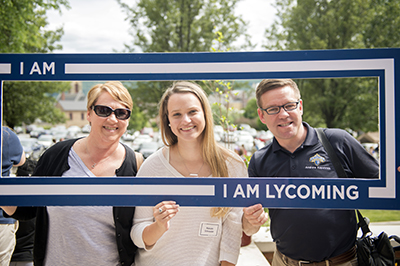
“Lycoming knows how to do it.” This sentiment voiced by a parent confirmed the success of changes made to Lycoming College’s orientation program this summer. The new program is better suited to the needs of the College’s changing demographics — more than 50 percent of its incoming class is from outside its home state of Pennsylvania or from other countries.
“We received positive feedback from parents and students this summer and we saw that our students were much more relaxed about starting classes this fall,” said Andrew Kilpatrick, dean of first year students, about the process of helping students transition to college.
The success of this summer’s orientation program was based primarily on reducing the time on campus from two days to one, a change that better suited parent and student schedules. With students becoming increasing technically savvy, they were able to complete more tasks online before arriving on campus for orientation. Students have been taking the modern language placement testing online for several years and this past spring, students also took their mathematics placement exams online.
“Allowing students to take the placement tests online takes away a lot of the anxiety with coming to campus,” Kilpatrick said. “When they’re here, we want them to focus on learning about their new living arrangements, selecting their schedule and meeting new friends, faculty and staff.”
Another change was to have students complete an online advising module ahead of orientation. The module provided initial information about curriculum requirements, obtained information about individual interests and intended majors, and allowed students to make some initial course selections. The information and partially completed schedules helped students and advisors make better use of their time together during on-campus meetings to finalize fall schedules.
“The streamlined approach to scheduling took much of the rush out of the meetings and allowed students and faculty to engage more meaningfully,” Kilpatrick said. His team also streamlined the other aspects of the on-campus portion of orientation — learning about information technology services, expectations for being part of the Lycoming community, and academic support services.
The one-day orientation program is now focused on those things that are best done face-to-face and allows more time for students to network with each other, as well as faculty and staff.
“This is our third child to go to college, but our first child to come to Lycoming College. My wife and I also went to different colleges. Today’s orientation was the best we have ever experienced. Lycoming knows how to do it. You guys are great!”
—a parent’s comments at the end of a June orientation session
The Lycoming staff made one more change to their program: adding more orientation sessions the week before classes start to accommodate the growing number of students coming from out of state and internationally.
“With more of our students coming from states like Texas and Florida, and more international students, we realized that travel costs preclude them coming to our orientation sessions in June,” Kilpatrick said. Coming to Williamsport a week early gives international students extra time to make arrangements for phone and banking services that they can’t bring from home.
“One thing has not changed, though — the genuine excitement we have about welcoming them into our community and giving them a first-rate education,” Kilpatrick said. “Conveying our commitment to them as individuals is our biggest priority, and that’s not going to change anytime soon.”
Lycoming’s genuine care for the College’s newest members is truly part of the program. Since many new students don’t have access to a car, Kilpatrick himself, with the help of a faculty and staff, drives new students to the local store for personal necessities. Attention to details like that is what makes Lycoming College special.
The majority of the changes to the orientation program were based on feedback surveys and a cross-campus collaboration in the months leading up to the first orientation session in June. Kilpatrick’s staff will be reviewing feedback from the latest round of orientations to continue to improve the efficiency of the program.
“Although we’re calling our new program a success, we’re going to continue to gather feedback and adapt so we are always responsive to our students’ needs,” Kilpatrick said.